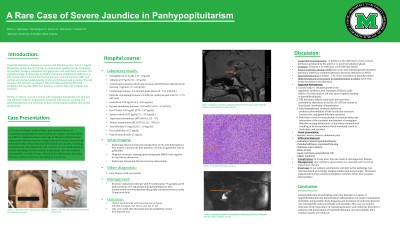Tuesday Poster Session
Category: Liver
P3869 - Rare Case of Severe Jaundice in Panhypopituitarism Patient
Tuesday, October 24, 2023
10:30 AM - 4:00 PM PT
Location: Exhibit Hall

Has Audio
- JW
Jennifer Wiese, MD
Marshall University
Huntington, WV
Presenting Author(s)
Jennifer Wiese, MD1, Abdelwahap Elghezewi, MD1, Mujtaba Mohamed, MBBS2, Nayiri A. Derian, MD1, Archana Ramalingan, MD1, Tejas Joshi, MD1, Wesam Frandah, MD3
1Marshall University, Huntington, WV; 2Joan C. Edwards School of Medicine, Huntington, WV; 3Marshall University Joan C. Edwards School of Medicine, Huntington, WV
Introduction: Hyperbilirubinemia and transaminitis are commonly associated with a defect in bilirubin metabolism, hepatocellular injury or inflammation, and obstructive cholestasis, and rarely with a disorder of endocrine function. It is mostly associated with cholestatic pattern of liver injury. The pathophysiology of cholestasis in pituitary hormone insufficiency/deficiency are still unclear, but it is known that thyroid hormone, growth hormone, and cortisol are involved independently in bile acid formation and secretion. Most of cases resolve with supplementing deficient hormones.
Case Description/Methods: Herein, we present a 25-year-old white lady patient with a past medical history of congenital hypopituitarism due to pituitary ectopia, who lost follow up with her endocrine doctor since age of 18, not on any hormone replacement therapy, presented with jaundice and bilirubin level of 9.9 mg/dl, AST/ALT 60/47 unit/l. Patient had a normal Magnetic resonance cholangio-pancreatography, hepatitis panel, autoimmune panel and liver biopsy. She was found to have low level of thyroid stimulating hormone of 0.16 Miu/L, free T 4 level of 0.59 ng/dl, serum cortisol of 0.5 mcg/dl. She was started on IV Levothyroxine 75mcg daily, IV Hydrocortisone 10-5 mg orally. Liver function started to improve with her serum bilirubin 3.5mg/dl, AST, ALT 33 and 27 unit/l at the time of discharge. She was discharged on oral Levothyroxine 88 mcg daily, Hydrocortisone orally 10 mg twice daily. Follow up labs one month after discharge showed completely normal liver function test.
Discussion: In conclusion, hyperbilirubinemia due to congenital hypopituitarism can occur in adults. Delayed recognition of underlying endocrine disorder as cause of hyperbilirubinemia and hepatocellular inflammation can result in end stage liver damage due to prolonged cholestasis. This case can remind clinicians of the importance of evaluating pituitary and endocrine disorder in patients with presentation of hyperbilirubinemia and transaminitis.

Disclosures:
Jennifer Wiese, MD1, Abdelwahap Elghezewi, MD1, Mujtaba Mohamed, MBBS2, Nayiri A. Derian, MD1, Archana Ramalingan, MD1, Tejas Joshi, MD1, Wesam Frandah, MD3. P3869 - Rare Case of Severe Jaundice in Panhypopituitarism Patient, ACG 2023 Annual Scientific Meeting Abstracts. Vancouver, BC, Canada: American College of Gastroenterology.
1Marshall University, Huntington, WV; 2Joan C. Edwards School of Medicine, Huntington, WV; 3Marshall University Joan C. Edwards School of Medicine, Huntington, WV
Introduction: Hyperbilirubinemia and transaminitis are commonly associated with a defect in bilirubin metabolism, hepatocellular injury or inflammation, and obstructive cholestasis, and rarely with a disorder of endocrine function. It is mostly associated with cholestatic pattern of liver injury. The pathophysiology of cholestasis in pituitary hormone insufficiency/deficiency are still unclear, but it is known that thyroid hormone, growth hormone, and cortisol are involved independently in bile acid formation and secretion. Most of cases resolve with supplementing deficient hormones.
Case Description/Methods: Herein, we present a 25-year-old white lady patient with a past medical history of congenital hypopituitarism due to pituitary ectopia, who lost follow up with her endocrine doctor since age of 18, not on any hormone replacement therapy, presented with jaundice and bilirubin level of 9.9 mg/dl, AST/ALT 60/47 unit/l. Patient had a normal Magnetic resonance cholangio-pancreatography, hepatitis panel, autoimmune panel and liver biopsy. She was found to have low level of thyroid stimulating hormone of 0.16 Miu/L, free T 4 level of 0.59 ng/dl, serum cortisol of 0.5 mcg/dl. She was started on IV Levothyroxine 75mcg daily, IV Hydrocortisone 10-5 mg orally. Liver function started to improve with her serum bilirubin 3.5mg/dl, AST, ALT 33 and 27 unit/l at the time of discharge. She was discharged on oral Levothyroxine 88 mcg daily, Hydrocortisone orally 10 mg twice daily. Follow up labs one month after discharge showed completely normal liver function test.
Discussion: In conclusion, hyperbilirubinemia due to congenital hypopituitarism can occur in adults. Delayed recognition of underlying endocrine disorder as cause of hyperbilirubinemia and hepatocellular inflammation can result in end stage liver damage due to prolonged cholestasis. This case can remind clinicians of the importance of evaluating pituitary and endocrine disorder in patients with presentation of hyperbilirubinemia and transaminitis.

Figure: Figure shows thin hair in the scalp and loss of hair in the eyebrows
Disclosures:
Jennifer Wiese indicated no relevant financial relationships.
Abdelwahap Elghezewi indicated no relevant financial relationships.
Mujtaba Mohamed indicated no relevant financial relationships.
Nayiri Derian indicated no relevant financial relationships.
Archana Ramalingan indicated no relevant financial relationships.
Tejas Joshi indicated no relevant financial relationships.
Wesam Frandah: Endo gastric solutions – Consultant. Olympus Medical – Consultant.
Jennifer Wiese, MD1, Abdelwahap Elghezewi, MD1, Mujtaba Mohamed, MBBS2, Nayiri A. Derian, MD1, Archana Ramalingan, MD1, Tejas Joshi, MD1, Wesam Frandah, MD3. P3869 - Rare Case of Severe Jaundice in Panhypopituitarism Patient, ACG 2023 Annual Scientific Meeting Abstracts. Vancouver, BC, Canada: American College of Gastroenterology.
